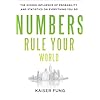The blog post by Vincent Granville “Data science without statistics is possible, even desirable” starts talking about “old statistics” and “new statistics”, which started some more discussion about how statistics and data science relate. Whereas I agree that there is something like “old” and “new” thinking of the role and the tools in statistics, I am less […]
Each year after the group stage, there is the much awaited drawing of the eighth-final, which essentially defines a team’s fate. So far the thing is not too complicated, as there are 16 teams out of which we need to generate 8 games – no problem if it would be possible to draw the teams without […]
I’ve been thinking about what Big Data really is for quite a while now, and am always happy about voices that can shed some more light on this phenomenon – especially by contrasting to what we call statistics for centuries now. Recently I stumbled over two articles. The first is from Miko Matsumura, who claims “Data […]
… would have been the better title for the book “Graphics of Large Datasets“. As the book was published a few years before the birth of the next buzz word promoted by McKinsey with the white paper “Big data: The next frontier for innovation, competition, and productivity“, we just did not know better. But to be […]
Google is certainly the world champion in collecting endless masses of data, be it search terms, web surfing preferences, e-mail communication, social media posts and links, … As a consequence, at Google they are not only masters of statistics (hey, my former boss at AT&T Labs who was heading statistics research went there!) but they also […]
With Big Data and the internet, we all feel like we can know and analyze everything. Certainly Google must feel that way, as they collect not only data, but also what we – the users – find interesting in that vast pile of information. As we should always keep in mind: Google is not charity […]
Well, to be honest, I see a far higher chance for him to win the tour, but first let’s look at the data. Having collected 10 years of Tour de France data, it is time to look at structural features of a whole tour. With a sample size of 10 (yes, still far away from […]
It is bold to post this after 30 mins in the game, but what can you say … (Just to make sure, this is just meant as an example for effective visualization 😉 )
After the first 4 stages passed, I will start to log the results in the usual way as in 2005, 2006, 2007, 2008, 2009, 2010, 2011, 2012 and 2013 now: Stage Results cumulative Time Ranks (click on the images to enlarge) – each line corresponds to a rider – smaller numbers are shorter times, i.e. better ranks – all […]
Posted on 10/19/2013, 11:56, by martin, under
General.
It is nothing new, to see the rise of some populist party right before an election, exploiting some anxiety in the population. With the AfD (Alternative for Germany) it is the easy to activate fear of economical decline, potentially caused by the economical solidarity within Europe. The set-up is simple, with an ever smiling economics […]
Posted on 10/01/2013, 21:10, by martin, under
General.
Now its time to show some maps. I won’t go through the usual party maps, as you might have seen them over and over again in TV, newspapers and the web (in fact it is impressing, what you get online by now!). Instead, I want to look the two losers of the election: FDP and […]
Posted on 09/29/2013, 20:36, by martin, under
General.
The german reunification is now on its way for almost a quarter of a century. One might think that by now, it might be hard to find the artificial division as a result from WWII, as structural features resulting from centuries of common history might be overruling what was a 40 year political intermezzo. Not […]



